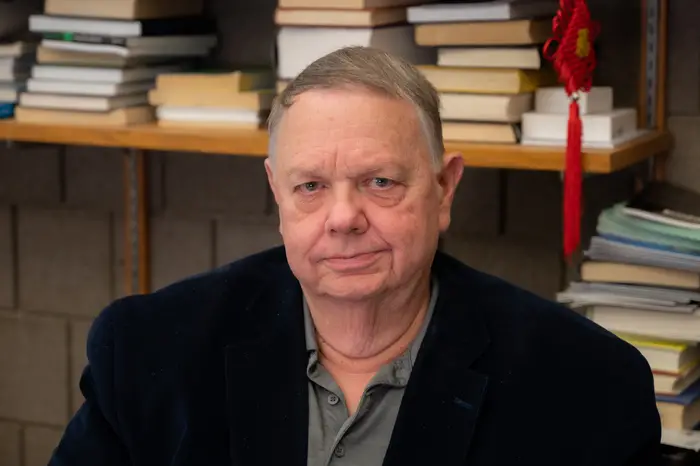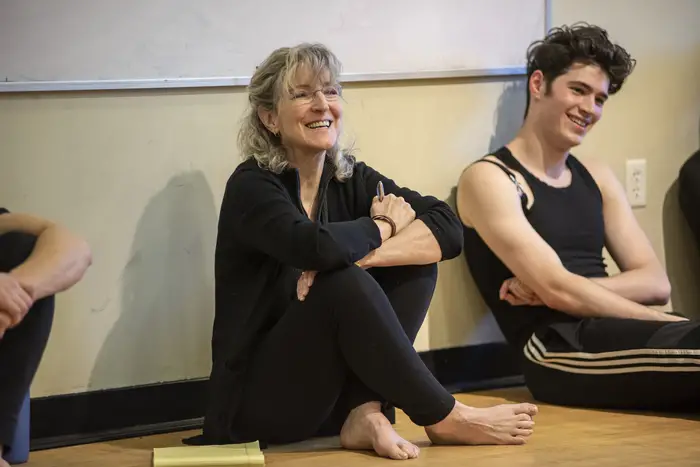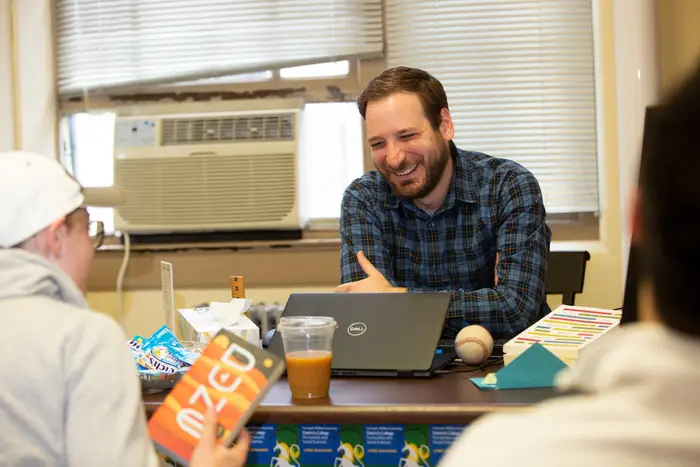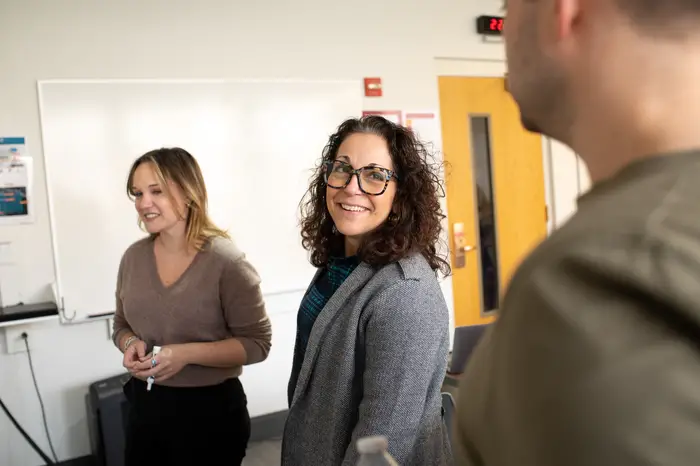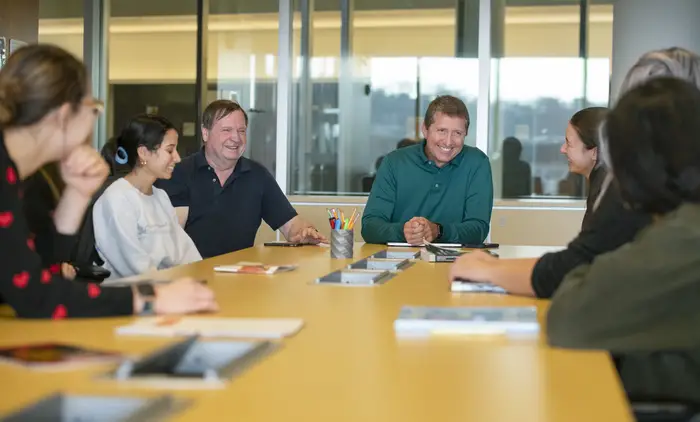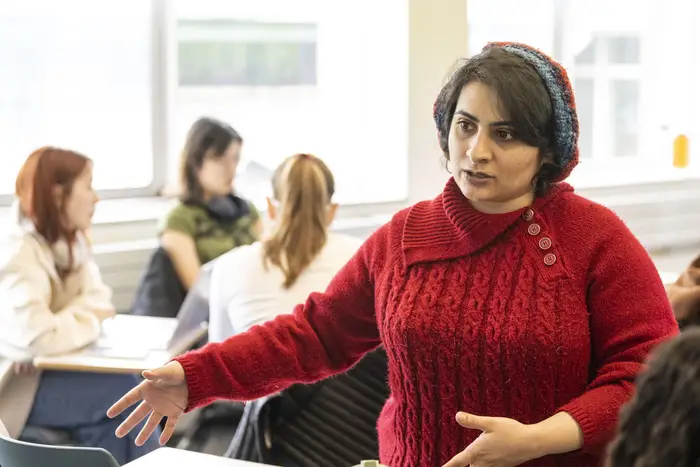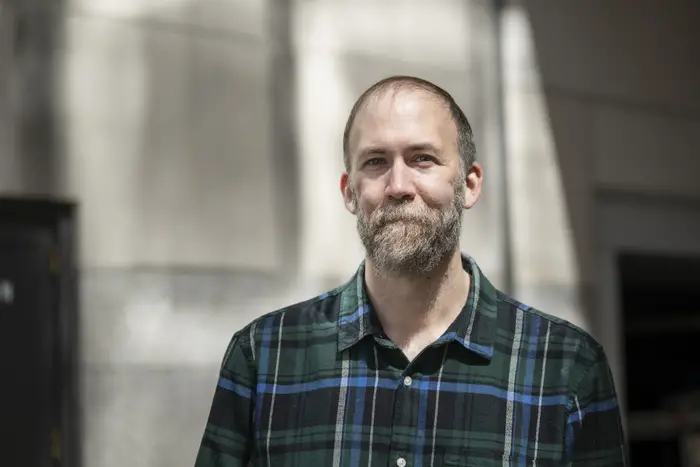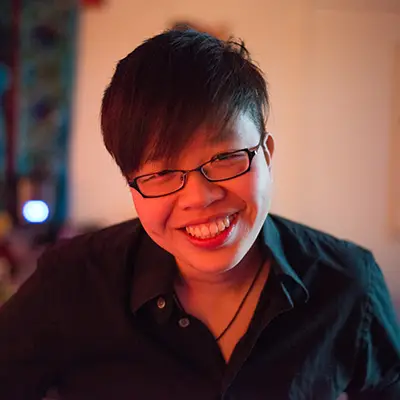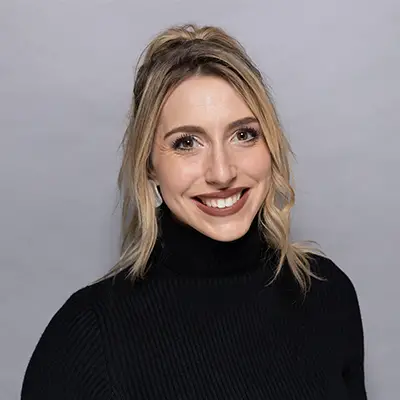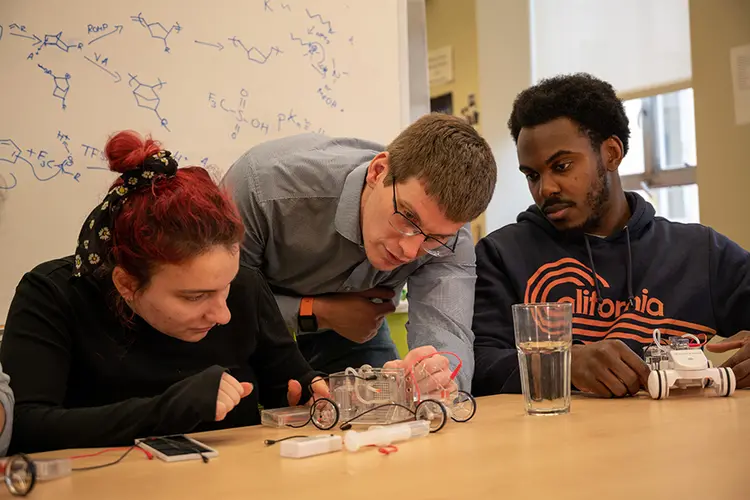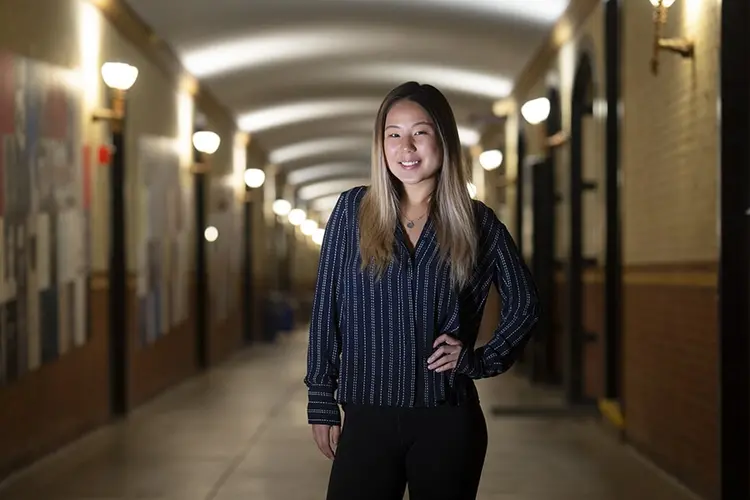CMU Highlights Educational Leaders Across Campus
Media Inquiries
Carnegie Mellon University honors faculty, staff and graduate students for their exceptional contributions in education, teaching, advising, mentoring and service with its annual Celebration of Education Awards(opens in new window). The awards recognize the accomplishments of those who exemplify the university's standards of excellence in education, and celebrates CMU’s distinguished faculty members and educators for their outstanding contributions and devotion to the university.
This year’s recipients are:
- William Hrusa, Robert E. Doherty Award for Sustained Contributions to Excellence in Education.
- Catherine Moore, William H. and Frances S. Ryan Award for Meritorious Teaching.
- Andrew S. Ramey, Award for Outstanding Contributions to Academic Advising and Mentoring.
- Danielle Wetzel, Barbara Lazarus Award for Graduate Student and Junior Faculty Mentoring.
- Mark Stehlik and David Kosbie, Mark Gelfand Service Award for Education Outreach.
- Motahhare Eslami, Teaching Innovation Award.
- Geoff Kaufman, Teaching Innovation Award.
- Đinh Ngọc Phượng (Phoebe), Graduate Student Teaching Award.
- Annie Behre, Graduate Student Service Award.
A Celebration of Education honoring the above award recipients will be held at 5 p.m. on April 27 in Rangos Ballroom.
Robert E. Doherty Award for Sustained Contributions to Excellence in Education
William Hrusa, Professor, Department of Mathematical Sciences, Mellon College of Science
Carnegie Mellon University’s Bill Hrusa(opens in new window) is as much a magician as he is a mathematician.
“Bill is the magician hidden behind the curtain that makes everything happen so that students can explore their full potential,” said CMU alumna Xiaofei Shi, who wrote one of the many letters of support that led to Hrusa being awarded the 2023 Robert E. Doherty Award for Sustained Contributions to Excellence in Education.
As a graduate student at CMU during the COVID-19 pandemic, Shi saw how Hrusa put magic into his lessons and his mentoring.
“His commitment to education and student development at graduate and undergraduate levels is unparalleled, and his influence to students is one of a kind,” said Shi, who is now an assistant professor at the University of Toronto.
Hrusa joined Carnegie Mellon as an assistant professor in 1982 and has been at the Pittsburgh campus save for three semesters in the 1980s when he was a visiting faculty member at the Math Research Center of the University of Wisconsin-Madison.
“Bill cares deeply about our students’ learning and the educational enterprise at large,” wrote Amy Burkert, vice provost for education(opens in new window). “He has had a tangible positive impact on the education of thousands of undergraduate and graduate students. He has also shaped and reshaped curricular practices and transformative educational programs.”
Hrusa’s impact on the mathematics curriculum at Carnegie Mellon and other institutions where alumni teach has been incalculable. When he designs or codesigns a course, Hrusa provides materials to subsequent instructors that become a part of institutional memory. Stephen Pankavich, a professor of applied mathematics and statistics at the Colorado School of Mines, recalls taking Hrusa’s course Calculus of Variations.
“The course materials (notes, homework, exams) that he constructed for this class have been widely used for the past two decades to teach similar undergraduate and graduate courses at other major research universities,” said Pankavich, who is a triple graduate of Carnegie Mellon’s Department of Mathematical Sciences(opens in new window) with a bachelor’s of science degree in 2000, a master’s degree in 2001 and a doctorate in 2005.
Pankavich also attended the Summer Undergraduate Applied Mathematics Institute (SUAMI) in 1998 as a junior. Hrusa has been a crucial part of SUAMI since its inception in 1992; the program provides research opportunities for students from groups that have been historically underrepresented in mathematics.
“Bill Hrusa changed my life in an overwhelmingly positive manner, and I am forever grateful for his insight and direction,” Pankavich said.
Along with teaching, Hrusa has served in administrative positions in the Department of Mathematical Sciences including as interim head, associate head and director of graduate studies. He currently directs the Bachelor of Science in Computational Finance (BSCF)(opens in new window) program.
Martin Larsson(opens in new window), a professor of mathematics and a member of the steering committee for the Master of Science in Computational Finance (MSCF)(opens in new window) program, wrote that the BCSF program has flourished under Hrusa’s guidance. Along with directing the BSCF program, Hrusa is the academic adviser for Carnegie Mellon’s Quant Club and helps organize events such as quantitative problem-solving competitions, panel discussions with alumni and industry figures and mock interviews. Many of the events have become traditions, he added, thanks to Hrusa’s advice, enthusiasm and guidance.
“There is now a vibrant and diverse community of students with a broad interest in computational finance,” Larsson said. “Bill’s efforts have also propelled the program’s external reputation to ever greater heights. BSCF students routinely secure internships and full-time positions at top banks such as Goldman Sachs, Bank of America, Barclays, Citi, Morgan Stanley, etc., as well as prestigious trading firms like Jump Trading, Jane Street and others. This success can be attributed in large part to Bill.”
The Doherty Award is Hrusa’s latest accolade for teaching. He previously won the university’s William H. and Frances S. Ryan Award for Meritorious Teaching and Barbara Lazarus Award as well as the Mellon College of Science’s Julius Ashkin Award and the Richard Moore Award. During his career, Hrusa has supervised six Ph.D. students, three honors master’s students and well over 100 undergraduate research students.
“I am grateful to have a job that I really love for more than 40 years where I have had the opportunity to interact with wonderful students and colleagues,” Hrusa said.
A professor in the Department of Mathematical Sciences, Hrusa holds bachelor’s of science degrees in mathematics and mechanical engineering from Syracuse University. He went on to earn a master’s degree and Ph.D. in applied mathematics from Brown University.
— Heidi Opdyke
William H. and Frances S. Ryan Award for Meritorious Teaching
Catherine Moore, Teaching Professor of Movement, School of Drama, College of Fine Arts
When alumni from the School of Drama(opens in new window)’s acting and music theater program reflect upon the impact Professor Catherine Moore(opens in new window) has had on their lives and careers, many of them recall her “icon project.” In this exercise, students select three distinct and iconic figures to study and then perform a monologue as each one — fully embodying their physicality, vocal quality and mannerisms.
“It was a class that changed my life as an actress,” said Gabrielle McClinton, a 2011 School of Drama graduate who has gone on to star on Broadway, television and film.
Devin Ilaw, a 2007 School of Drama graduate, calls Moore’s “icon project” one of the most challenging and rewarding experiences he had at CMU.
“The feeling I achieved in this singular exercise will forever be etched in my heart as one of the reasons why I love my artform and have made theater my life’s work thus far,” he said.
Moore has become an iconic figure herself since arriving at the School of Drama in 2000. Specializing in physical approaches to actor training, her teaching includes techniques such as Viewpoints, Suzuki, Laban, Michael Chekhov and stage combat. Some of the more than 80 School of Drama productions she has worked on as fight director or movement coach include: “Ragtime,” “The Rover,” “Anthony and Cleopatra,” “The Rivals,” “Sweeney Todd,” “Spring Awakening,” “Mad Forest,” “In the Blood,” “Richard III,” “The Piano Lesson,” “Equus,” “Marisol,” “The Duchess of Malfi,” “Trojan Women: A Love Story,” “The Playboy of the Western World” and “A Midsummer Night’s Dream.”
In addition to her class and production work, Moore is a driving force behind one of the School of Drama’s most celebrated and unique offerings, Playground — an annual festival of independent student work, which celebrated its 20th year this past December. It began in 2003, with Moore and Professor Dick Block at the helm, as a way to provide students the time and space to create their own work, untethered from grading, assessment or even their own area of study. Designers might perform; actors might write; managers might design. Playground offers students the invaluable opportunity to explore and create with no repercussions for failure. Moore has been part of the organization, curation and artistic encouragement of the Playground festival since the beginning, and it has not only been a creative haven for School of Drama students, it has been the launchpad for some of their professional endeavors.
“Catherine Moore is the reason the San Francisco Bay Area Theater Company (SFBATCO) exists,” said co-founder and artistic director Rodney Earl Jackson Jr., a 2013 graduate of the School of Drama. Jackson and a classmate entered what he called an ambitious creative project into Playground in 2010. From there, the piece went on to the New York Fringe Festival, and eventually led to the creation of SFBATCO.
It is obvious from the outpouring of support and gratitude from Moore’s former students what an impactful educator she is.
“In this second decade of my career, years removed from her classroom, I often call upon the lessons Catherine imparted to me with such care,” said 2003 graduate and Tony Award-winning actor Leslie Odom, Jr. “The Ryan Award is an honor that recognizes, with distinction, examples of excellence in teaching. I am quite certain you could find no stronger candidate than Catherine Moore.”
— Shannon Musgrave
Award for Outstanding Contributions to Academic Advising and Mentoring
Andrew S. Ramey, Senior Academic Advisor, Department of History, Dietrich College of Humanities and Social Sciences
“I know this will sound like a cliche, but winning this award is not just a personal achievement. I think it reflects the people and culture of Dietrich College(opens in new window),” Andrew Ramey(opens in new window) said. “I am proud to accept the Advising Award not just for myself, but on behalf of all my colleagues and my students, because I could not have developed into the advisor and person that I am without their support and encouragement.”
Ramey began his educational journey at CMU in 2009 as a graduate student pursuing a Ph.D. in the Department of History, which he earned in 2015. Ramey returned to the Department of History in 2017 as an academic adviser and has advised and mentored undergraduate students across the department’s three majors: social and political history; ethics, history, and public policy and global studies.
“The level of commitment, dedication and passion he has for his job is just incredible,” said Nico Slate(opens in new window), professor and head of the Department of History. “The thing that has left me with the deepest and most important impression about Andrew is his kindness.”
To ensure the student experience outside of the classroom was as impactful inside the classroom, he helped co-found the Dietrich College of Humanities and Social Sciences’ Pittsburgh Summer Internship Program(opens in new window) (PSIP) and joined the advisory committee for the Dietrich College Community Engagement Fellowship(opens in new window).
Ramey has spent the past five years building partnerships across campus to support students, advisers, staff and faculty. During the COVID-19 pandemic, he joined the Advisor Professional Development Committee and helped co-create a pair of reading groups to create a space for advisers to connect virtually to remain engaged in important topics related to advising, higher education and society.
He also brings his expertise and knowledge to the CMU community as an instructor and scholar in the history department, teaching a variety of first-year courses. He won the department’s Goldman Award for Excellence in Graduate Student Teaching in 2015 and has continued to explore the intersection of advising and classroom instruction for supporting students.
Ramey’s academic pursuits have been published in a peer-reviewed volume on nuclear energy policy, and he has presented his scholarly work at numerous national and regional conferences. He has given public lectures on topics related to his expertise in environmentalism, U.S. politics and the Chesapeake Bay.
Ramey has accepted a position as a director of advising in the Dietrich College Academic Advisory Center(opens in new window). He will begin the position on June 1.
“In my new role as director of advising for Dietrich College, I want to build on the strengths our team already has and create an even better culture of supporting our students and each other,” he said.
— Stacy Kish and Stefanie Johndrow
Barbara Lazarus Award for Graduate Student and Junior Faculty Mentoring
Danielle Wetzel, Teaching Professor, Director of Writing & Communication Program, Department of English, Dietrich College of Humanities and Social Sciences
Danielle Zawodny Wetzel(opens in new window) started her professional journey at CMU as director of CMU’s First-Year Writing Program in 2006 and transformed the program over the next 13 years.
“We work with many loving people at Carnegie Mellon. (And yes, I do mean “We work with many loving people at Carnegie Mellon. And yes, I do mean loving.) I have been thinking about the people in our campus community who bring open hands. When we keep our hands open to each other, we can mentor and be mentorable, at any stage in our professional lives,” said Wetzel, director of CMU’s Writing & Communication Program(opens in new window) and Writing & Culture Pre-College Program(opens in new window).
Wetzel focuses primarily on teacher training, curriculum design and assessment, specifically for first-year writing. Her interests include how we design instruction to help linguistically diverse students make data-informed, mindful and culturally aware writing decisions for the genres they produce.
In his nomination letter, David Brown(opens in new window), the associate director of first-year writing for research and assessment and an associate teaching professor of English, commended Wetzel’s planning and administrative skills to develop a high-caliber writing program at CMU.
“(The program) speaks to Danielle’s leadership and ability to nurture the talents of those she supervises. For without those capacities, the program would cease to grow and innovate in the ways that it has under her leadership. It is her genuine interest in her colleagues’ success as instructors and reflective practitioners that has helped it to thrive,” Brown wrote.
Wetzel’s commitment to the department includes the ways she connects meaningfully with others.
“She is a model all of us can admire and emulate,” wrote Andreea Ritivoi(opens in new window), department head and William S. Dietrich Professor of English. “I have benefitted tremendously and frequently from her wise counsel, incredibly strong listening skills, understanding and compassion. In moments of celebration as well as in moments of crisis, Danielle is the steady ground: firm and supportive at once, clear-headed and loving. She is a moral point of reference in our community.”
Cody Januszko(opens in new window), a Ph.D. student in the Rhetoric Program(opens in new window) and a graduate instructor in the Writing & Communication Program, took Wetzel’s Theory and Design of Writing Instruction course — a core course for English Ph.D. students who teach first-year writing — and found Wetzel “to be incredibly engaging, balancing her clear expertise in writing studies along with a positive energy to draw us into discussions,” Januszko wrote. “In this class, I gained a solid foundation in pedagogical theory that has helped me as I teach and plan my own course.”
Early in her career, Amy Burkert, vice provost for education, worked with Barbara Lazarus and believes Wetzel’s spirit would make Lazarus proud.
“As I reflect on Danielle — who she is, what she stands for, and all she has done for our students, our faculty and this institution — I am confident Barbara would be pleased to know that her own legacy of mentorship and advocacy is being carried on and is in the worthy and capable hands of others with Danielle Zawodny Wetzel among those leading the way,” Burkert wrote.
— Stacy Kish and Stefanie Johndrow
Mark Gelfand Service Award for Education Outreach
Mark Stehlik, University Professor, Director of the CS Undergraduate Program, Assistant Dean for Outreach, School of Computer Science
David Kosbie, Teaching Professor, School of Computer Science
Between them, David Kosbie(opens in new window) and Mark Stehlik(opens in new window) have taught computer programming to thousands of CMU undergraduates. But in a world where the need for computer science education in middle and high school far surpasses its availability, neither could rest on their laurels teaching solely at the college level. They envisioned a world where middle and high school students anywhere could access computer programming courses well before college — a world where such a curriculum was not only free, but also came with baked-in teacher resources and technical support.
Their vision became reality in 2018 with the launch of CMU CS Academy(opens in new window), an online, graphics-based computer science curriculum that Kosbie and Stehlik designed with the support of SCS undergraduates to teach students how to program in Python. The curriculum features free 24/7 teacher support, ongoing professional development, auto-graded exercises, and a teacher portal filled with customization features and resources.
Initially, CMU CS Academy offered one course to about 400 students in 14 school districts. Today, the program boasts five courses, has more than 250,000 student accounts and has reached more than 3,000 teachers across the country.
"
Kosbie and Stehlik's collaborators at the Allegheny Intermediate Unit agree.
"The collaboration between CS Academy and the Allegheny Intermediate Unit truly offers a model in how public education institutions and universities can work collaboratively to scale innovative solutions across a state in a systematic, creative way," wrote Tyler Samstag, director of Instructional Innovation for Allegheny Intermediate Unit, in his nomination letter. "I am grateful to CS Academy’s commitment to outreach, their dedication to leveraging public educators as co-designers, and their ambitious and equitable goal to ensure computer science opportunities are available for all students, regardless of their race, economic status, or what school district they attend. It has truly made a huge impact across Pennsylvania."
Students and teachers beyond Pennsylvania feel that impact, too.
"The CMU CS1 class enables teachers of all programming abilities to introduce students to programming in a way that electrifies them and gets them excited to learn Python," said David Snyder, director of educational technology at Seton Hall Prep in New Jersey. "Just as important, we have noticed that a disproportionately high number of minorities as well as students from lower economic backgrounds are taking this course. The creators of this class have made programming easily accessible for people from all backgrounds.
"Carnegie Mellon should be proud of what it has accomplished. The impact is powerful."
— Susie Cribbs
Teaching Innovation Award
Motahhare Eslami, Assistant Professor, Human-Computer Interaction Institute
The first class Assistant Professor Motahhare Eslami(opens in new window) taught when she joined Carnegie Mellon University's Human-Computer Interaction Institute (HCII)(opens in new window) and Software and Societal Systems Department(opens in new window) was one of the institute's required courses, User-Centered Research and Evaluation. The course, which serves about 100 students each semester, uses a real-world project to teach research methods that center users in designing and developing technological systems.
While the course is well established, Eslami noticed that it didn't discuss the risks and challenges these systems can cause, such as inflicting harm on marginalized groups through bias and discrimination. To fill that gap, she designed the course project to investigate fairness, accountability, transparency and ethics (FATE) issues in technical systems. But after talking with students, Eslami realized that FATE content proved a little complex for an introductory class. It deserved its own course.
Thus FATE in Socio-Technical Systems was born.
Offered to students across the entire university, the FATE course focuses on real-world FATE applications. Eslami shares her own experiences as an employee of Meta and Adobe, but also calls out other examples to highlight fairness issues, like how facial-recognition technologies exhibit racial bias in detecting darker skin tones or that ad-targeting algorithms display significantly more high-paying jobs to men than to women. She also prepares students to be vocal about FATE issues by requiring them to present a seminal work in the area and lead discussion of it. Finally, students choose a real-world FATE issue to study as part of the course project. A few teams, for example, focused on the racial bias in Pittsburgh's predictive policing system, and how to understand communities’ perceptions of and concerns surrounding it.
The course has been so popular and successful — and the university has realized how important the topic is for the future of technology design and development — that the HCII is in the process of making it a permanent addition to its course catalog.
"Motahhare recognized that we equip our students with great technical skills, but we do not consistently train them about ethical challenges these computer systems might introduce into real-world settings," wrote Jessica Hammer(opens in new window), the Thomas and Lydia Moran Associate Professor of Learning Science in the HCII and Entertainment Technology Center(opens in new window), in her nomination letter. "Her interventions are modular, scalable and subtly designed to address a challenging problem: not just teaching about FATE concepts, but also setting our students up to be people who see FATE as their responsibility and are prepared to take effective action."
Students have also praised the course and the impact it's made on their futures.
"Professor Eslami’s creation of the FATE course and support in investigating and advancing real FATE knowledge has helped shape the direction of my Ph.D. work," wrote HCII Ph.D. student Jaemarie Solyst. "With a new emphasis on fair AI and ethical technology design processes, this course has filled a gap in educational offerings and will greatly benefit future technologists that study at CMU."
— Susie Cribbs
Teaching Innovation Award
Geoff Kaufman, Robert E. Kraut Associate Professor of Human-Computer Interaction, Ph.D. Program Director, Human-Computer Interaction Institute
When Geoff Kaufman(opens in new window) first joined the Human-Computer Interaction Institute (HCII) faculty in the School of Computer Science(opens in new window), he noticed two ways that many of the institute's project courses fell short: They rarely featured inclusion and accessibility as explicit priorities for technology design, and they didn't focus on inclusion and belonging within the actual student teams. Even the first two iterations of his own course, Persuasive Design, fell into the same trap. Final projects ignored early lessons on bias and featured stereotypical central characters, for example, or took the form of mobile apps that couldn't be used by people with visual impairments. Beyond that, he heard rumblings of inequity and insensitivity within the teams.
Something had to be done to provide guidance and support for students, and to create a climate of safety and belonging.
So Kaufman, the Robert E. Kraut Associate Professor of Human-Computer Interaction, revamped the course to prioritize the goals of both teaching students how to design inclusively and empathetically — an important area of his own research — and how to be inclusive and empathetic teammates. He completely redesigned the activities for the first half of the project, focusing them on a set of team assignments that gave students practice thinking about diversity, equity and inclusion in their design work and using inclusive design tools. These same activities also aimed to create a welcoming environment within teams as they learned to work with each other.
The results? A marked increase in students’ sense of team belonging and a doubling in projects that discussed DEI and accessibility. And the appreciation of his students.
"Throughout both of my experiences in Geoff’s Persuasive Design course, he went above and beyond to foster one of the most enriching learning environments I have ever enjoyed," wrote HCII Ph.D. student Erica Principe Cruz, who took the class and later served as a teaching assistant for it. "His warmth and enthusiasm for the course content and his dedication to seeking out students’ perspectives for further discussion and application of concepts turned the class into an experience that felt like a guided adventure through persuasive design concepts, research, applications and evaluations of them."
His students also didn't overlook his dedication to DEI in all he does.
"Professor Kaufman’s innovation takes the form of a carefully formulated and robust focus on diversity, equity and inclusion. This innovation is deeply embedded in the course and syllabus design, and emerges both explicitly and implicitly in materials, assignments and pedagogy," wrote Samantha Reig, an HCII Ph.D. student who both took the course and later became a teaching assistant for it.
"Professor Kaufman has designed a class in which students learn by practicing inclusive norms in an inclusive environment while designing and evaluating inclusive and equitable technologies that persuade people to do right by themselves and each other," Reig said.
— Susie Cribbs
Graduate Student Teaching Award
Đinh Ngọc Phượng (Phoebe), Department of Psychology, Dietrich College of Humanities and Social Sciences
“Phoebe has served as a teaching assistant for three courses and received high praise from all of her faculty mentors,” said Vicki S. Helgeson(opens in new window), professor and director of graduate studies in the Department of Psychology(opens in new window). “She is serving as a role model as a teacher, mentor and human being for students at all levels.”
Đinh began their academic journey at CMU in 2017 with adviser David Rakison(opens in new window), associate professor in the Department of Psychology. Their research is focused on how knowledge of causal relations and mechanisms is obtained in infants and adults, and how this knowledge enables or impedes one's interactions with the causal world.
They have blended their research with teaching and lecturing for five courses, including an undergraduate research methods course and graduate courses in cognitive psychology, biological foundations of behavior and principles of child development. Their approach in the classroom encourages a learning environment that is co-created, justice-centered and fun.
“A message (that I would give) to any student at any level who may be considering teaching: it involves a lot of growing pains,” said Đinh. “I’m there too. I may have my growing pains until I stop teaching.”
Đinh admits they learn just as much from their students they teach. Teaching is a source of growth and inspiration.
In addition to teaching, Đinh has mentored three undergraduate and one graduate student in the Infant Cognition Lab(opens in new window) at CMU.
Đinh believes that becoming a teacher is a communal process. For this reason, they want to thank their community elders, friends, co-conspirators and, of course, students and mentees for helping them become the teacher-learner that they are today.
“I think about all the great teachers who I’ve had in the past that got me here in the first place,” said Đinh. “If I could be that person for another young person, then wonderful.”
After completing their Ph.D. program, Đinh will begin a full-time lecturer position at Tufts University in the Psychology Department.
Đinh holds a B.A. in philosophy and a B.S. in cognitive and brain science from Tufts University. They have contributed to eight scholarly publications and chapters. Đinh has received the Herb Simon Graduate Student Teaching Award in 2020, the Gelfand Student Educational Outreach Award in 2019 and the Dick Hayes Departmental Service Award in 2018. They also completed the Future Faculty Program through the Eberly Center for Teaching Excellence and Educational Innovation(opens in new window).
— Stacy Kish and Stefanie Johndrow
Graduate Student Service Award
Annie Behre, Department of Biomedical Engineering, College of Engineering
Annie Behre's passion for biomedical engineering (BME) supersedes her studies. An engaged member of the community, she fosters connections among her department and with young learners across the Pittsburgh community.
As fourth-year Ph.D. student and an officer of the Graduate Biomedical Engineering Society (GBMES) Behre organized a Biomedical Engineering Symposium and the 2021 Virtual Northeast Bioengineering Conference. The events served as opportunities for graduate students from Carnegie Mellon and beyond to connect over research and advance their professional development.
Behre also helped her fellow engineering students navigate the uncertainty brought on by the global pandemic by organizing and hosting events promoting wellness and creating a sense of community.
An integral part of the department's diversity, equity and inclusion committee since its development, she organized a college level DEI-focused book club during the height of the pandemic for the community to bond over timely and important topics.
"There is not one committee or group within our department, that has graduate students as members, that Anne has not been an active and executive board member of as she cares so deeply about and is invested in the CMU BME community," says Rachelle Palchesko Simko(opens in new window), a professor in the biomedical engineering department(opens in new window).
Behre's commitment to inspiring the next generation of science, technology, engineering and math (STEM) student and leaders isn't limited to her graduate student classmates.
Volunteering with the Leonard Gelfand Center for Service Learning and Outreach(opens in new window), Behre took on organizing multiple outreach activities focused on bringing STEM students across Pittsburgh.
She created a summer course for middle school students to learn about 3D bioprinting, expanding access by crafing a series of weekend workshops as well.
The course was so successful that she helped expand it into a collaboration with the Citizen Science Lab, a local nonprofit organization that brings students in once a week for an entire school year to take part in STEM classes.
Students taking the course learn to build their own bioprinters, ultimately bioprinting cells by the end of the school year. Behre takes great joy in working hands-on with the individual students to cultivate and promote their enthusiasm for learning complex topics through interactive activities.
"Annie is an exceptional leader who has worked hard to cultivate a positive and inclusive environment," says fellow GBMES officer Barbie Varghese.
Behre's commitment to serving the department and community are evident in her leadership, outreach and consistent dedication to improving the experience of those around her.
A passion for improving lives through biomedical engineering infuses her work at every level. From her research in enhancing injury healing through bioprinted hydrogel-based scaffolding, to her outreach developing educational outreach programs for youth interested in STEM, Behre continually shares her passion and knowledge for science with the community.
— Yana Ilieva
